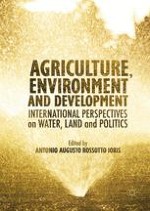2016 | OriginalPaper | Buchkapitel
4. On the Climate of Scarcity and Crisis in the Rainfed Drylands of India
verfasst von : Zareen P. Bharucha
Erschienen in: Agriculture, Environment and Development
Aktivieren Sie unsere intelligente Suche, um passende Fachinhalte oder Patente zu finden.
Wählen Sie Textabschnitte aus um mit Künstlicher Intelligenz passenden Patente zu finden. powered by
Markieren Sie Textabschnitte, um KI-gestützt weitere passende Inhalte zu finden. powered by
